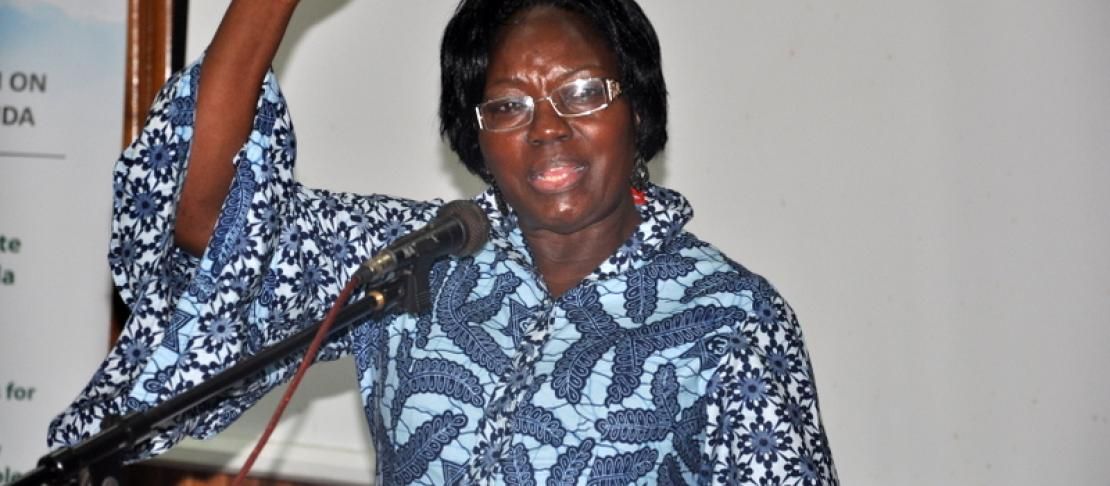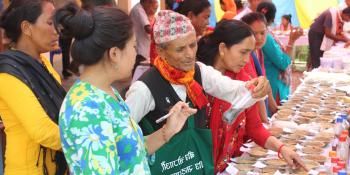Informing policies with evidence: gender, climate change, and food security in Uganda

Researchers in Uganda engage with policymakers to help drive evidence-based decision-making.
As communities are experiencing climate change in Uganda, the impacts are not felt by everyone in the same way. Research shows that men and women are affected differently when weather patterns shift. Imagine a household in which the husband migrates to find work because the harvest is no longer enough to feed the family, and the wife is left at home to cope with an even greater burden of responsibility. Or a village where school age girls are responsible for collecting water and the distance they must travel increases when a seasonal well dries up.
Gender inequalities and constraints, often embedded in norms, practices, and legal provisions, have traditionally institutionalized discrimination against women and girls. In Uganda, customary rules and practices have tended to restrict women’s access to key resources, and this has negatively affected household food security and nutrition. Although women and men play distinct but vital roles in ensuring food security and enhancing agricultural productivity, gender inequalities in access to ownership, and control of production resources, such as land, credit, and extension services, have lowered women’s adaptive capacity to the impacts of climate change.
Discussions about the impacts of climate change on agriculture are often centered on how temperature and rainfall changes will decrease productivity of the sector. But at the recently concluded high-level engagement held at the Parliament of Uganda, researchers discussed with parliamentarians, permanent secretaries, commissioners and civil society organizations the interaction between gender, climate change, and food security. In response to the evidence presented at the event, Ilukor Charles, the Member of Parliament for Kumi County said:
I have now seen the linkage between gender, climate and food security.”
Spurring gender responsiveness
The high-level engagement breakfast meeting at the Parliament Conference Hall on 30 August aimed at creating awareness and advancing gender responsiveness to climate change adaptation within the newly elected members of the 10th Parliament. At the event, Hon. Rebecca Kadaga, the speaker of parliament, expressed concern about extension services.
We talk about agriculture being the backbone of this country but there is no one guiding the farmers. How many extension workers do we have in Uganda?,”
she asked, adding that the executive committee on climate change forum should move a motion demanding the Minister of Environment to bring the Paris Agreement for debate in the Parliament.
While presenting the national perspective on gender and climate change, Hon. Winnie Masiko, the gender and climate change negotiator for Uganda at the United Nations Framework Convention on Climate Change (UNFCCC), told legislators that there are not clear guidelines to incorporate gender in projects. She highlighted challenges and opportunities for mainstreaming gender in climate change, adding that the forthcoming climate change bill was a good opportunity to maximize gender integration.
We need to develop a Gender and Climate Change Strategic plan,” she said.
Policy analysis findings
Edidah Ampaire, coordinator of CCAFS’s Policy Action for Climate Change Adaptation project (PACCA), presented findings of the gender and policy analysis research. Despite women contributing significantly to agricultural production, gender issues are not well articulated in agriculture-related policies and implementation strategies. Those that do capture gender lack a clear road map for implementation and do not indicate implementation budgets. Gender integration in extension delivery at district and lower levels is further constrained by limited skills for conducting gender analysis, articulating identified needs and opportunities, and lack of a gender budget.
Presentation by Dr. Edidah Ampaire, PACCA Project Leader
Reports from the Ministries of Agriculture, Water and Environment, and Gender, Labour, and Social Development were presented. Presenters communicated the strategies they had in place as well as the challenges encountered.
The presentations made at the event were a good introduction for the new members of Parliament, who are keen to understand the key issues they have to grapple with to improve the food security of the country. Ensuing discussions pointed to the need to fight corruption so that finances can be invested in creating gender-sensitive development impact; adoption of approaches that can feed research back to the grass roots so that interventions are designed to address gender inequalities, and the rampant destruction of environment, for example, cutting of fruit trees to make charcoal, which worsens food insecurity.
Opportunities for progress
The Kitgum Municipality Member of Parliament, Beatrice Atim Anywar, acknowledged the importance of the high level meeting that highlighted the need to put gender at the center of climate change adaptation. Reflecting on food security and the burden women carry in putting food on the table, Betty used the opportunity to speak for the Biotechnology Bill that will soon come to the Parliament. She explained the inter-relationship between biotechnology, women, climate change and food security, and asked MPs to pass the bill so that it can support food security initiatives.
The high level event represented an important step towards inclusive and integral gender discussion at the climate change adaptation and mitigation negotiations currently occurring at the Parliamentary Forum on Climate Change such as the discussions on the Uganda Climate Change Bill, the Biotechnology Bill and more generally, the preparations for the upcoming negotiations at the 22nd Conference of Parties (COP22) in Morocco.
The meeting was organized by the Uganda Parliamentary Forum on Climate Change (PFCC) and the Parliamentary Forum on Food Security, Population and Development (PFFSPD) in partnership with the CCAFS PACCA project which is led by the International Institute of Tropical Agriculture (IITA).
Related stories
- Uganda’s policy makers to consider gender and climate research
- Cultivating equality in a changing environment: the need for appropriate gender budgets
PACCA is an activity of the CGIAR Research Program on Climate Change, Agriculture and Food Security (CCAFS), implemented by the International Institute of Tropical Agriculture (IITA), International Center for Tropical Agriculture (CIAT), the World Agroforestry Centre (ICRAF), the International Livestock Research Institute (ILRI), and local partners in Uganda and Tanzania. The project seeks to influence and link policies and institutions from national to local level for the development and adoption of gender responsive and climate resilient food systems.
John Francis Okiror works in the communications team at the International Institute for Tropical Agriculture. He supports communications for the IITA-led PACCA project.



